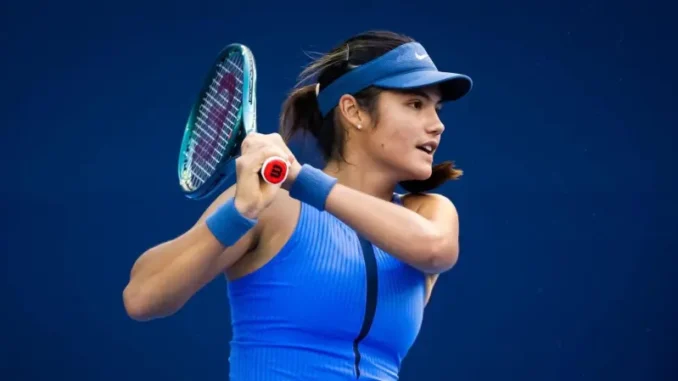
In the glittering arena of professional tennis, where every rally pulses with raw ambition and unyielding pressure, Emma Raducanu remains a beacon of untamed potential. At 22, the British sensation who stunned the world by clinching the 2021 US Open as a qualifier—becoming the first qualifier in history to lift a Grand Slam trophy—has long symbolized the thrill of the unexpected. Her game, a blend of blistering baseline power, silky net play, and an almost ethereal composure, promised a dynasty. Yet, four years on, as autumn leaves swirl across Beijing’s courts, Raducanu finds herself grappling with a familiar ghost: the elusive breakthrough against the sport’s elite. Her No. 1 priority, declared with fierce clarity just weeks ago, feels tantalizingly close yet perpetually out of reach—a summit she scales only to slip back down.
It was at Flushing Meadows, under the relentless New York sun, that Raducanu laid bare her mission for the season’s final stretch. Fresh off a gritty campaign marked by flashes of brilliance amid frustrating inconsistencies, she spoke with the quiet fire of someone who’s tasted glory but craves dominion. “Playing these top opponents, you get a feel for it every time. It’s difficult,” she admitted, her words carrying the weight of a thousand practice sessions. “Right now I’m just working on developing and building my game… I need to play these top girls and I think a win against one of them gives you a lot of confidence in general, but I know I just need to keep doing the right things day to day and the results I can’t really control. But I think I’m just working towards getting closer and closer to the top ones.” This wasn’t mere rhetoric; it was a battle cry. For Raducanu, toppling a top-10 foe isn’t just a stat—it’s the psychological key to unlocking her full arsenal, the spark to reignite the prodigy who once dismantled Leylah Fernandez in straight sets for immortality.
Her 2025 season, a rollercoaster of resilience and near-misses, has underscored the urgency of that vow. Kicking off Down Under at the Australian Open, Raducanu carved a path to the third round, her straight-sets defeat to world No. 1 Iga Swiatek a testament to her growing threat level rather than a defeat. From there, the calendar unfolded like a grueling odyssey: solid quarterfinal runs in smaller events, upsets over seeded players like Naomi Osaka and Maria Sakkari in key tournaments, and a career-high tally of 27 wins against 19 losses. Prize money swelled past $1.3 million, a nod to her marketability and on-court evolution. Yet, the narrative twisted with injuries and scheduling tweaks—echoes of the post-US Open burnout that sidelined her for months in 2022 and 2023. Raducanu, now ranked No. 32, has leaned into strategic risks, like partnering with former Rafael Nadal coach Francisco Roig earlier this year. Under his tutelage, her movement sharpened, her serve gained bite, and she pushed Aryna Sabalenka to the brink in a three-hour epic at the Cincinnati Masters—a loss, yes, but one that whispered of parity with the queens.
If Cincinnati hinted at ascent, the autumn swing has been a cruel tease. Two weeks ago in Seoul, at the Korea Open, Raducanu stood on the precipice of her fourth top-10 victory. Facing 2024 Wimbledon champion Barbora Krejcikova, she dominated the first set 6-4 and clawed through a marathon second, only to squander three match points in a heartbreaking 7-6(10) tiebreak. Krejcikova, sensing blood, stormed back 6-1 in the decider, leaving Raducanu to rue what might have been. “It was right there,” she might have thought, the sting sharper for its proximity. Undeterred—or perhaps fueled by it—she jetted to Beijing for the WTA 1000 China Open, bypassing the first round to face Cristina Bucsa in a routine 6-3, 6-2 warmup. Momentum built; the third-round clash with world No. 7 Jessica Pegula promised redemption.
What unfolded was poetry in agony. Raducanu seized the opener 6-3, breaking Pegula twice and dictating with ferocious forehands that evoked her halcyon days. She even snagged an early break in the second, eyes locked on history. But Pegula, the steely American with a penchant for third-set surges, clawed back. The set dragged to a tiebreak, where Raducanu’s three match points evaporated like morning mist—unforced errors, a net cord betrayal, Pegula’s unerring returns. The decider? A 6-0 demolition, Pegula’s experience turning Raducanu’s dreams to dust. It marked her third straight defeat to top-10 caliber foes: Rybakina at the US Open (1-6, 2-6 in the third round, a clinical takedown after Raducanu’s valiant second-round upset of Sofia Kenin), Krejcikova’s Seoul snatch, and now Pegula’s Beijing masterclass.
These aren’t just losses; they’re lacerations to the soul of a competitor who’s rebuilt herself from ankle surgeries and coaching carousel spins. Raducanu’s game is evolving—Roig’s influence evident in her improved endurance and tactical depth—but the mental fortitude to seal the deal against the Sabalenkas and Swiateks remains her white whale. Each blown opportunity chips at confidence, yet it also forges steel. “The results I can’t really control,” she reminded herself at the US Open, a mantra for the long haul. As the Asian swing yields to the indoor hard courts of Europe, with the WTA Finals on the horizon, Raducanu’s priority burns brighter. A single top-10 scalp could cascade into contention, propelling her back into the top 20 and beyond.
In Raducanu’s story, frustration and fire intertwine like vines on a trellis. She’s no longer the wide-eyed teen; she’s a warrior, 22 and battle-tested, whose every swing carries the echo of that 2021 triumph. The slips—Seoul’s squandered points, Beijing’s tiebreak torment—hurt because they’re so close to salvation. But tennis, like life, rewards the relentless. With Roig in her corner and a season of hard-won lessons behind her, Raducanu isn’t slipping away; she’s inching upward, one defiant rally at a time. The top ones? They’re on notice. Her date with destiny awaits, and when it arrives, the courtside roar will remember why she was always meant for this.
Leave a Reply